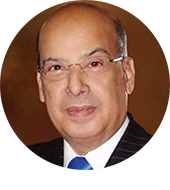
IF ever there was a time in global politics when governments did not indulge in deliberately and maliciously running smear campaigns against candidates they oppose for international positions, it has now passed.
Indeed, powerful countries, that should be able to use their vast diplomatic machinery to argue the merits of candidates they support, are the ones that now employ tactics of character assassination and the use of agents in the media and elsewhere to discredit contenders who they oppose.
These agents are either uniformed and gullible; are compensated for their collaboration; or they have benefited from favours in the past and are hoping to be rewarded in the future.
In the case of the current campaigning for the post of Secretary-General of the Organisation of American States (OAS), the larger and more powerful states of the organisation that are anxious to re-elect their ally, Luis Almagro, for the advancement of a very narrow, ideological political agenda, have pulled out all the stops to revile Maria Fernanda Espinosa, the lone woman in the three-cornered race.
To be clear, the Government of Canada, one of the countries that makes the largest contributions to the OAS, is not one of the governments that has stooped to this low level. Two other, large financial contributors – Mexico and Argentina – have joined many Caribbean countries in unequivocally backing Ms. Espinosa.
The fear of losing Mr. Almagro, as what the Jamaica Gleaner newspaper recently described in an Editorial, as their “opinionated ideologue”, has driven his backers to new heights of calumny.
Previously, the claim was made that, in nominating Ms. Espinosa for the OAS post, the governments of Antigua and Barbuda and St Vincent and the Grenadines are operating as surrogates for Cuba and Venezuela. It is worth my repeating that, in nominating Ms. Espinosa, only other CARICOM governments were consulted. Our governments have an obligation under the CARICOM Treaty to coordinate our foreign policy positions with other CARICOM governments and we do so steadfastly. We would have as much objection to the governments of Cuba and Venezuela trying to dictate to us as we have to any other government attempting to do so. Perhaps the concept of small countries valuing their sovereignty is too difficult for big countries to appreciate.
The smearing of Ms. Espinosa has since escalated. The most recent slur is that the Government of the Peoples Republic of China (PRC) is paying her to seek the OAS job. Hence, Antigua and Barbuda and St Vincent and the Grenadines must be party to this Chinese scheme. The fact that St Vincent and the Grenadines has diplomatic relations with Taiwan and not the PRC, is an inconvenient reality that is brushed aside by those promoting this false narrative.
The other more pertinent fact that is supressed is that the government of the PRC is a permanent observer to the OAS, and it contributes financially to the Organisation with no strings attached. None of the OAS member states object to accepting the PRC’s money.
Nonetheless, the smearers of Ms. Espinosa’s character claim that she received an award from China that had a financial component. The truth is that she received the award from Rehabilitation International, a non-governmental organisation headquartered in New York, that works to empower people with disabilities. She was nominated for the award by several UN Ambassadors for her active work on disabilities while serving as President of the UN General Assembly.
This was one of several awards bestowed upon Ms Espinosa for her work at the UN. As recently as January 30, she was recognized at the Sundance Film Festival in Utah, along with Baroness Emma Nicholson, as a woman who has made an international impact. She received an award from the Zions Bank, which has Mormon origins in Salt Lake City. It is left to be seen whether she will now be accused of being an instrument of the Mormon Church of the Latter-day Saints.
Another claim directed at Ms. Espinosa is that her husband, Eduardo Mangas, is “a close advisor” to Daniel Ortega’s “anti-democratic” regime in Nicaragua. The facts reveal a different story. Mr. Mangas was a UN official for several years before taking up a one-year appointment in Nicaragua, the country of his birth, in 2009. But, as in all campaigns designed to defame, twisting information to create a false impression is par for the course. In any event, even if Mr. Mangas was an adviser to the Ortega government at one point, what turns on that? Many others have been key advisers to other governments, and those relationships have since ended. Are they and their spouses to be measured eternally by the governments for which they once worked?
To be clear, the governments of Antigua and Barbuda and St Vincent and the Grenadines, along with heads of government of several other CARICOM countries, were very impressed by Ms. Espinosa’s impartial Presidency of the UN General Assembly. They saw in her performance what they desired in the leadership of the OAS. That is, a statesperson working in the interest of all member states, excluding none and constantly building consensus. Maria Fernanda did not advance any ideological position, nor was she once accused of seeking to give an advantage to the agenda of one country or region.
In the causes she promoted at the UN, peace and security played a large part, but she did not neglect vulnerable groups, climate change, economic development and human improvement. These latter issues – of great importance to the majority of states – have been shamefully neglected in the OAS.
Powerful groups have the resources to smear reputations in their own interest; the weak and the vulnerable should sift the wheat from the chaff.













